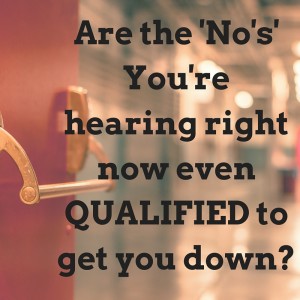In my life, I’ve heard that word way more often than Yes.
The word No is, for me, like stairs are for the Kung Fu Panda: Unpleasant, and there are way too many of them.
Example: During one of my nine sales attempts (each lasting for 2-6 months), I sold credit card processing services. During that 6-month time, I’ve heard the word No over 7000 times, and heard the word Yes… MAYBE five times? This was my second most successful attempt at a sales-type job.
As you can see, the law of numbers has not historically worked out in my favor.
If you’re reading this and thinking: “This is me right now!”, you’ve probably come to one of several conclusions:
First, you must improve your skills at getting to yes.
Second, you must find a way to make NO hurt less than it does now.
There are many ways to do the first one, most of which is education and training. Learning about trust has helped me with some of that, which is why I wrote the Emotionally Bulletproof books. Trust has allowed me to hear more No’s than I could have faced otherwise, and has helped lead to Yes in a few profound ways throughout my life.
For the second part, you must perform some level of mental fortification. You’ve got to build some walls.
The best walls are like the walls of your cells, the tiny wardens protecting your body. They have permeable membranes, so they will let some stuff in while keeping other stuff out.
So how can you develop a wall – a permeable membrane – to keep the No’s from hurting?
Watch these logical gymnastics. They may work for you.
DISCLAIMER: These scenarios are related to business No’s, selling to strangers, where the line between respecting people’s boundaries and being a jerk is thicker and harder to define than romantic relationships. Do not test the boundaries of a romantic relationship using this type of logic. Life experience has taught me that many of these are No’s in that area of life.
But when your livelihood is on the line and you’ve got to make that sale, read on.
Is This ‘No’ Qualified to Hurt You?
I’ve found that most aren’t. So I’m listing some No’s that you should no longer even count as No’s. They are pretenders, and trying to take good paying jobs away from the hard working No’s that belong in this country!
Sorry, wrong rant.
Here are the ones that don’t count anymore:
If the person in front of you does not have the authority to say ‘Yes’, it isn’t technically a No.
If the decision maker was angry, stressed, or tired right before you showed up, it’s not a No.
Can you possibly put them in a better mood? Yes. Skill plays a factor.
Sometimes you can even judge timing to reduce the likelihood of this, and it’s your responsibility to look into that. Sometimes, however, there’s nothing you can do. They wanted to say No to something and you showed up right on time. They probably weren’t even really listening.
If they didn’t understand what you were offering, it’s not a No.
Given, you have to take responsibility for how clearly you communicate; that doesn’t ever change. Still, some people are easily distracted, dumb, late to come to the meeting and early to leave, illiterate, etc. Also, if they say Yes to things they don’t understand, they aren’t your ideal customer anyway.
If you left a voicemail, got lost in a phone tree, or had to leave an email… if you didn’t get a response it’s not a No.
Most people are busy. Some people (Me) are cowards, and don’t want to say No to your face. Make sure the No doesn’t count unless you hear it from them.
If they said Yes to someone else offering the same thing, it’s not a No; it’s a Not Now.
I don’t care if their brother does their photography for them. Maybe their brother will move/quit/get sick/go on vacation/die tomorrow. If they said Yes to somebody, they have a need. It’s just not you that’s fulfilling that need right now.
If they said Yes in the past to someone who burned them, and now they don’t trust others, it’s not a No.
You just need to build trust with them. Decide whether or not it’s worth the time and choose. Bad apples ruin it for everybody, most of all for those who can’t hear No.
If they give an objection, it’s NOT a No.
Objections usually mean they want to talk to you about something. This can be good. If they have many objections and still manage to find a few more, it IS a No.
If they do not have the money to say Yes, it is a No.
If they haven’t graduated middle school, have no job, or are bankrupt, they usually aren’t your ideal customer.
If the decision maker is unavailable due to busy season, family emergency, vacation, etc, it’s not a No.
If they’re going out of business, it’s not a No.
Humor aside, there is a delicate balance between respecting boundaries and knowing when to keep asking questions. It’s a balance I’ve never fully learned, so don’t take me as the source of all wisdom here.
In any situation, it is your responsibility to learn and adjust to the circumstances of life. Respect people’s decisions, and try to know when they’ve truly made a choice one way or another.
BONUS: If the cops are escorting you off of the premises, guess what? You’ve just heard a No.





![When this dog gets mean, could you survive an attack? By ARD (Own work) [CC-BY-SA-3.0 (http://creativecommons.org/licenses/by-sa/3.0)], via Wikimedia Commons](http://upload.wikimedia.org/wikipedia/commons/thumb/b/b9/C%C3%A3es_pitbull.jpg/256px-C%C3%A3es_pitbull.jpg)

